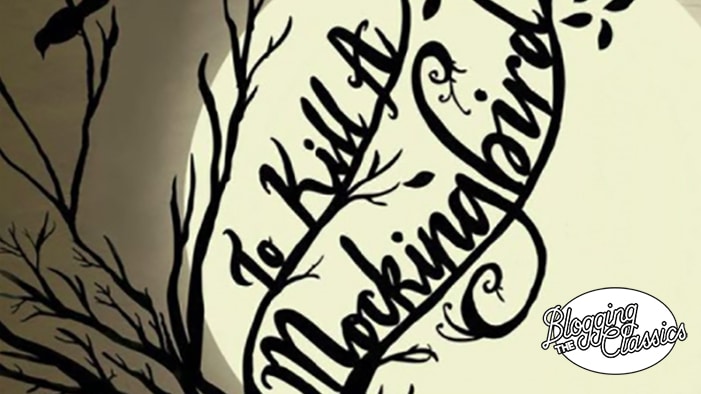Blogging To Kill a Mockingbird: Chapters 12 & 13

To read parts 1—8 of Blogging To Kill a Mockingbird, click here!
It’s Chapter 12, and Jem is a teenager now. He’s moody, he’s insufferable, and he’s probably covered in zits no matter how much he washes his face. We’ve all been there. It’s kind of like Franz Kafka’s The Metamorphosis, except instead of transforming into a gross terror monster, Gregor Samsa merely becomes a bug.
Scout hates teenager!Jem. Worse still is that her future husband, Dill, is not coming to visit this summer. Scout therefore finds herself spending a lot of time with Calpurnia, who she now sees as more of a friend and less of a JOYLESS PRISON WARDEN HELL-BENT ON HER EVENTUAL DESTRUCTION.
In fact, when Atticus is out of town, Calpurnia even takes Scout and Jem to church with her. She can’t trust them to go to church by themselves, because they almost burned someone alive in the church basement one time. (You know, as you do.) Cal’s church is called First Purchase, so named because it was bought by the first freed slaves. This is a new one for the siblings Finch, who have only ever attended Maycomb’s all-white congregation. On the whole, they’re welcomed with open arms, mostly because their father is so cool that his coolness transcends all racial boundaries.
Scout notices immediately that Calpurnia adopts a different dialect around her fellow black churchgoers. Also of note: the church doesn’t have hymn-books (most of the congregation can’t read), everyone seems closer and more tight-knit than what Scout is used to, and the reverend collects money specifically to help Helen Robinson, Tom Robinson’s wife, who can’t get a job because no one wants anything to do with someone whose husband was accused of raping a white woman. Yikes.
After the service is over, Scout and Jem ask Calpurnia questions they’ve apparently never thought to ask in their multiple years of life, like how old she is (she doesn’t know for sure), when her birthday is (she just celebrates it on Christmas because it’s easier), and where she grew up (Finch’s Landing).
It’s a fine chapter with only one problem: To Kill a Mockingbird is a story about racism, and these scant few pages are the only real glimpse we get into the lives of actual black people in the entire book. What’s up with that?

Plot twist! It’s chapter 13, and Aunt Alexandra is coming to stay with them for an unspecified, possibly endless, number of weeks. You’ll remember Aunt Alexandra as Atticus’ sister who lives at Finch’s Landing and finds Scout’s overalls to be very upsetting.
Aunt Alexandra fits right in with the town of Maycomb. She knows everything about everybody, and she is obsessed with lineage and heredity. Everyone, in her view, has some sort of streak that runs in the family—“a Drinking Streak, a Gambling Streak, a Mean Streak, a Funny Streak.” My family has a Blue-Eyed Streak, a Perfect Teeth Streak, and a Fun, Easygoing Streak, and somehow I wound up with green eyes, braces, and generalized anxiety. Clearly, I’m some sort of changeling.
Aunt Alexandra also believes that being a Finch makes you better than everyone. She’s like a slightly less obnoxious Draco Malfoy, although without the platinum blond coiffure.
Scout isn’t buying what Aunt Alexandra is selling. Just because a family goes back generations doesn’t make them “Fine Folks.” By that logic, the Ewells—who have been around since the Mesozoic Era but are pretty much the worst people in all of Maycomb—would be the finest folks in town.
At Aunt Alexandra’s behest, Atticus tries to get Scout and Jem to care about their ancestry, but all that happens is Scout begins to cry. Atticus tells her to forget everything he said. It’s Aunt Alexandra who cares about that stuff, not him.
Before he leaves, he also says, “Don’t you worry about anything. It’s not time to worry.” Not yet, anyway.
NOTABLE QUOTES
I never understood her preoccupation with heredity. Somewhere, I had received the impression that Fine Folks were people who did the best they could with the sense they had, but Aunt Alexandra was of the opinion, obliquely expressed, that the longer a family had been squatting on one patch of land the finer it was.
THIS AND THAT
- Dill is staying in Meridian for the summer because his mother got remarried.
- These chapters mark the beginning of Scout’s evolving view of femininity. She’s upset when Jem tells her she needs to start acting more like a girl, but after spending time with Calpurnia, she begins to believe there’s some skill involved in girlhood.
DISCUSSION QUESTIONS
On the whole, Scout’s characterization of Maycomb’s black population is a positive one. They’re generous, welcoming, and close-knit. Is there anything troubling about this characterization? After all, “positive stereotypes” are still stereotypes. What makes “positive stereotypes” inherently negative?
Looking for the rest of our Blogging the Classics series? Click here, or you can check out the SparkNote!













